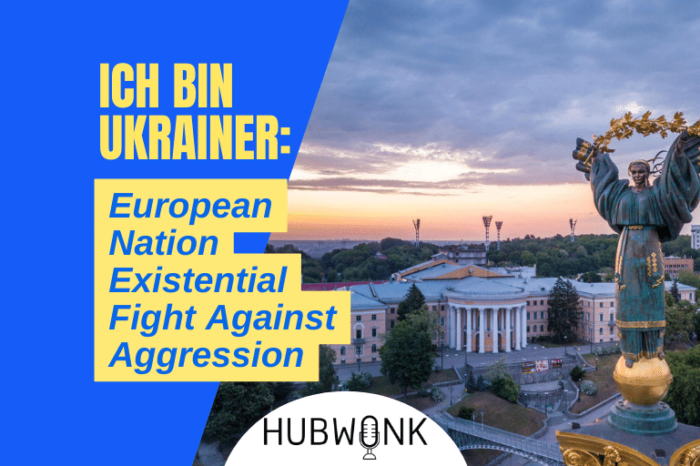Ich Bin Ukrainer: European Nation Existential Fight Against Aggression
/in Featured, Podcast Hubwonk /by Editorial StaffHubwonk host Joe Selvaggi talks with former CEO of Kyiv Post and senior fellow at the Institute for the Study of War Nataliya Bugayova about her research on the rise of Vladimir Putin and how it can inform understanding of the Russian invasion, particularly when viewed through the eyes of Ukrainians.
Guest:
 Nataliya Bugayova is a non-resident National Security Fellow at the Institute for the Study of War, where she led Russia & Ukraine research team. Nataliya serves as the Director of Strategic at Vertical Knowledge. She was the CEO of the Kyiv Post. She also served as Chief of Staff and Adviser on cooperation with international financial institutions to a Ukrainian Economy Minister after the Euromaidan Revolution in February 2014. She holds a Master’s in Public Policy from Harvard University’s Kennedy School of Government. She is also an ISF fellow at Schmidt Futures. She is originally from Ukraine.
Nataliya Bugayova is a non-resident National Security Fellow at the Institute for the Study of War, where she led Russia & Ukraine research team. Nataliya serves as the Director of Strategic at Vertical Knowledge. She was the CEO of the Kyiv Post. She also served as Chief of Staff and Adviser on cooperation with international financial institutions to a Ukrainian Economy Minister after the Euromaidan Revolution in February 2014. She holds a Master’s in Public Policy from Harvard University’s Kennedy School of Government. She is also an ISF fellow at Schmidt Futures. She is originally from Ukraine.
WATCH:
Get new episodes of Hubwonk in your inbox!
Read a Transcript of This Episode
Please excuse typos.
Joe Selvaggi:
This is Hubwonk. I’m Joe Selvaggi.
Joe Selvaggi:
Welcome to Hubwonk, a podcast of Pioneer Institute, a think tank in Boston. The eyes of the world have turned to Russia’s February invasion of Ukraine, where for the first time, since the second world war a sovereign European country is facing an existential threat from an advancing army. The Russian leaders, Vladimir Putin characterized it as a military action necessary to rescue fellow Russians from an oppressive fascist dictatorship. The Ukrainians themselves led by their charismatic president. Volodymyr Zelensky have defied this narrative by both mounting armed and civilian resistance, and also waging and winning the public opinion campaign for support from the United States and Europe in an epic struggle to defend its right to sovereignty over the might of a former superpower. The Ukrainian people have accepted the mantle of frontline combatants, defending freedom and the international rule of law, but it prevail over a determined aggressor with ambitions to return Russia, to its former Soviet prominence.
Joe Selvaggi:
And what could those of us who look on in horror do to help them in their struggle? My guest today is senior fellow from the Institute for the study of war Nataliya Bugayova where she leads the Russia and Ukraine portfolio. Her work focuses on the Kremlin’s foreign policy decision making and ongoing global campaigns. Her research paper entitled how we got here with Russia. The Kremlin’s worldview written in 2019 is a chillingly precedent analysis of president Putin’s ambitions to ive the humiliation of the fall of the Soviet union and lead Russia back to its role as rival to the us and the west. Miss Bugayova will share with us how the themes in her research should inform our understanding of this war and guide our response. She’ll also share with us, her experience of having her country attack and trying to help friends and family survive the onslaught. When I return, I’ll be joined by Institute for the study of war senior fellow Natalia Bugayova. All right, we’re back. This is Hubwonk I’m Joe Selvaggi, and I’m now pleased to be joined by national security fellow for the Institute for the study of war. Nataliya Bugayova. Welcome to Hubwonk, Natalia Bugayova.
Nataliya Bugayova:
Thank you. Great to be here
Joe Selvaggi:
Now, before we dive into the details of our our discussion of the, which is the invasion of Ukraine by Russia you’ve had a long journey to get to the, the Institute for the study of war. In fact, we knew each other back in 2012 at, at Harvard Kennedy school. But for our listeners, take us through that journey. How did you go from a Ukrainian citizen all the way over to the United States to to the study of war?
Nataliya Bugayova:
Absolutely. so I’m originally from Ukraine from Eastern Ukraine and town called. I came to us first as an exchange student then returned to Ukraine where I studied in college and worked in KF. Then I came back to the us for grad school at HKS where we’ve met then returned to Ukraine again shortly before the Euro revolution of 2013, 2014. And it was truly a privilege to be a part of those events and help with the reform efforts first working for the ministry of economy, and then becoming the CEO of ke of post, which was Ukraine’s English language, independent publication at the time. And then I moved back to the us in thousand 16 and had been working at the Institute for the study of war in very roles. One of which was leading Russia and Ukraine research program. I remained national security file S w and work at a technology company at my day job. And so I have been working in Russia since 2014 and various roles including in the field of open source intelligence and military analysis.
Joe Selvaggi:
So before we get it into that analysis you say your hometown is in Eastern Ukraine. It’s a very difficult place to live. I hope your your family and friends have found safety there.
Nataliya Bugayova:
No, thank you for asking. I was able to evacuate my grandparents. One of whom is disabled and my mom who are now in Europe but other members of my family are in Ukraine and some of them are still in, which is now experiencing heavy Shein by the Russian forces.
Joe Selvaggi:
I’m sorry to hear that. And I, I wish them well. Now I thought your at piece for the Institute for the study of war offered a, a superb understanding of how we got here with Putin. You know, he is a man who lives through the collapse of the Soviet union. And that I think helps inform our understanding of who this man is. I don’t wanna oversimplify the thesis of your work, how we got here with Russia. But by my reading I’m gonna, I’m gonna paraphrase and then ask you to embellish a little on this. I would say Putin’s view is is a deep resentment in the Russian loss of stature after the fall of the, of the Soviet union. He had a, has a nostalgia re return that the power of that empire, if you will. And he sees the west as an obstacle to that return to greatness and, and, and resents the us and, and the west for that take us through the thesis of your research and, and, and it, it, it more or less shows an evolution from a fairly friendly post follow the Berlin wall, Russia, to where we are now with a full scale invasion of Ukraine. Take us through that arc of how we got here.
Nataliya Bugayova:
Sure. Look, I think Putin’s objectives have not really changed for years. They’ve always been the preservation of his regime efforts to restate Russia as a global and great power regain dominant influence over the former Soviets states and can us and neutralized NATO, I think regaining control over Ukraine remained a consistent goal for him for many years. And his intent when it comes to Ukraine is really independent of the west. And I think it’s a really key point. Us actions and NATO actions might have accelerated or dampen the Kremlin actions in some cases, but again, his goals Putins goals remain the same. And in fact, it’s really key to remember that the efforts to reintegrate. So, so that space have actually started even before Putin. It was president Yeltsin that who already adopted more assertive national security concept in 97, which include more paternalistic policy toward the forms of its states. So when it comes to Ukraine, you know, Putin tried to regain dominant influence through many means. First by trying to install political puppets, then through military intervention in 2014, and then through may any attempts to manipulate both Ukraine and the west into giving up Ukraine sovereignty essentially for the past eight years. And none of those efforts really worked. So put in kind of resorted to the last stool he had left from probably his perspective, which is a full, full on military offensive that he has launched last month.
Joe Selvaggi:
Oh, sorry. I wanted to, excuse me. I just wanted to get to the first point you made in that, that response, which is I think addressing some level of narrative here in the us that this rationale for this invasion of Ukraine was somehow precipitated by let’s say the accretion of states into NATO or the EU, in other words, as a response to what he saw was a slow threat to throw growing and, and ever closer threat from, from NATO or the us, you’re saying no independent of our act or NATOs actions or these actions Russia and Putin had designed on influencing neighbor states all along.
Nataliya Bugayova:
Correct. I do think that Western actions, once again served as an accelerator or, or Deener in some cases, but really the intent has the, and consistent for years. And I think it’s also really important to, to say that, you know, there was a brief period of Nonas assert foreign policy only for a few years in 1990s which I think many in the us believed have become the new norm, but in my assessment it was an anomaly because it was actually Ys Wright who reversed to, to the course of trying to be more istic towards the forms of its states already in late nineties. And couldn’t continued that trend in really award and in action for the next 20 years.
Joe Selvaggi:
Well, another simultaneous trend were those former Soviet states who I’d like to hear your opinion on that decided to look westward and, and either join EU or NATO. I don’t know what the count is. I believe eight or nine states that had been a Soviet satellite states now are members of NATO. Forgive me if this is a a naive question, why wouldn’t Russia be enticed to join the west, at least at some level rather than position itself, as in, in clear opposition,
Nataliya Bugayova:
The, the point about states joining the west and Russia’s argument about the fear of influence, right. That it deserves. First I was just like, would like to point out that I think this, this argument is inde defensible in many ways. You know, first the world, including Russia recognized Ukraine’s independence and independence of many former Soviet states in 1991. And no independent state should need to justify its existence. It’s foreign policy ambition, no matter how big or small it is. And you know, I think that’s point number one, point number two look, it was Russia’s and the Kremlin’s choice first and foremost to do so in part, because pus number one goal is preservation of his regime. And a lot of the I think Western values and rules are antithetical to his efforts to preserve his regime, which he does through Corion corruption and broadly authoritarian methods. So I think that’s actually the core reason why Russia, despite perhaps some of its ambitions to join the west has not because the model is antithetical to Kremlin’s model of regime preservation.
Joe Selvaggi:
So, so let’s focus now on your country, Ukraine which ha hasn’t joined the EU hasn’t joined NATO but clearly has gone from, let’s say a country, largely sympathetic to Russia and being a partner or a an ally of Russia to where we see now the, the brave of Vladimir Zelensky clearly with a Western focus, one who seems to aspire to the freedom and, and and the values of the west. How did we get from a, a country that was largely Russian, like to one that seems to be leaning strongly westward?
Nataliya Bugayova:
Sure. Look, I think Ukraine’s, and Russia’s path has started to diverge actually shortly after the Soviet union collapse and divide has never been actually about ethnicity and language. And I can tell you that as a, you know, originally Russian speaking Ukrainian the core divide has been always about the way of life. And the origin revolution off to south and four was the first clear indication that Ukraine went, did to evolve, to be the country with rights and rules. And the 2014 revolution was of course the pivotal moment. And again, the choice was not primarily about the west or the east. It was about whether to become a police state like Russia or not. And may in Ukraine made that choice in 2014 and, and some, you know, paid the ultimate price. And I was part of the events on, you know, on neuro down in thousand 14. And it’s worth noting that Ukraine has been the only country in the form of its space that has had legitimate con consecutive presidential elections, and the only country that had free media, no matter how limited but nevertheless free and, you know, no matter the issues. And of course the known issue with the corruption. I think the trajectory has been for years much before Lansky kind of toward a free year or state.
Joe Selvaggi:
Now you, you mentioned so that, that it’s this divide dates back to the fall of the Soviet union. And it’s a, it’s a, it’s a argument of a difference between in values or aspirations for one’s country rule of law. Now you, you made reference to, I, I believe it’s called the Euro Maden, a revolution in Ukraine and Russia did not sit by idly and, and watch this happen. In fact, of course the Russia did invade portions of Ukraine back in 2014, say more about what you think the motive was for that. Was that something as a, as a sort of a, a Sabre rattling, or was this a a long slow design on actually taking over Ukraine in the long run?
Nataliya Bugayova:
Yeah. Great question. Look, I think first Ukraine’s freedom aspirations that were expressed very clearly in 2014, the it pose a threat from Putin’s perspective to Russian his regime precisely because the democratic model in the former Soviet its space can both, you know, endanger Putin’s regime, but show in Russian’s an alternative, but also in danger Putins project to integrate the other states in the forms of its space into kind of Russia dominated frameworks. I think in my assessment least was planned long before 2015, given the speed with which was, it was executed. I putting use the opportune moment essentially when there was a weakness in Ukrainian governance after shortly after the Euro revolution to both cease crime and launch military invasion in DOAs, I think it’s also were noting that again, as in many cases, the goal us to control Ukraine and to control its decision making. What Russia tried to do for the subsequent eight years is to use the illegal self reclaimed, you know, DNR and LR republics in Eastern Ukraine, and try to insert them in Ukrainian governance system with the, with no success. So once again the goal always been and always remained control and in 2014, Russia saw an opportunity to go for portions of Ukraine, essentially militarily, I think again, CIA was planned long before 2014.
Joe Selvaggi:
So okay. The it’s now that we’ve got a, a good history lesson up to current times now, of course we have to talk about a a war. Now Ukraine is roughly the size of Texas, an enormous country with 44 million inhabitants. One does not need to be a a student of the study of war to know that to quell a, a population of that size you would need at a substantial force as one who studies war it seems that that that force was woefully inadequate for the job. Is this mistake attributable to the idea that Putin had perhaps thought Ukraine would be let’s say less resistant to deliberate invasion.
Nataliya Bugayova:
Yeah, great question. I mean, Putin has made several substantial miscalculation in his war effort and, you know, while he will and can recalibrate, I think several issues cannot be quickly undressed. And one of those is that fact that currently yet get misunderstood Ukraine. I think Russia miscalculated local sentiment in 2014. When if you recall, Russia wanted to take six regions of Ukraine, at least in 2014 and managed to secure only two portions of two regions in part, because it had actually miscalculated loyalties on the ground resistance and the sentiment. And it seems that ye eight years after despite the fact that Ukraine has been openly building up its defenses with Western support, the Kremlin has seemed not to have learned that lesson and shown that it does not still MIS understand Ukraine’s military capability or popular sentiment, including what’s really important. And among Russian speaking population, because right now the military action is happening in law part in east and south of Ukraine. And I think in part because Putin and then Kremlin has always assigned very little agency to Ukraine, a classical I think Imperial or great power mistake. And I think it accounts for some of the miscalculation, I think in addition to that, it also, just to me, a bigger problem of analytical reporting chain within Kremlin that might be broken.
Joe Selvaggi:
So you, you had mentioned agency Ukraine has a considerable amount of agency here. They’re putting up a hell of a fight. As someone who’s become a world celebrity in this process has been the president Zelensky he’s winning the public opinion, battle hands down. He’s been, I suppose, compared to even a, a Winston Churchill for our time. Do you see the fight that the Ukrainians are putting up, particularly, as you say, it’s, it’s even the Russian speaking Eastern Ukrainians are putting up a hell of fight. Is this owed to his inspiration and leadership, you think any reasonable leader in that position w would, would still see and still be leading a, a a fiercely resistant Ukrainian population?
Nataliya Bugayova:
No. Great question. Look, I think he is doing a fantastic job. However, I think Ukrainians have well sort pass dependence on one leader and it’s really important to highlight. And you know, even during your, my Don revolution of 2014, there was no one leader on my Don. It was a lot of self organizing, self driven effort at the grassroots level. And similarly, when Russian forces lunch and intervention in south 14, Ukraine actually didn’t have military or army at that point practically. And it was a lot of just local volunteers who went to, to the front line and fought at the time when Ukraine even didn’t have a president. So I think w landscape without the fight will continue though. He’s certainly I think an inspiration figure for many in the world during this time.
Joe Selvaggi:
So let’s get into the on the ground. Again, you’re a student of the study of war. What’s the current military situation on the ground here on day 20.
Nataliya Bugayova:
Sure. A couple of quick points first, you know, put into original plan to seize Ukraine in a matter of days has failed. Russia has not established air or ground superiority yet. And this is despite billion dollars of investment, you know, years of military reform combat experience, Russia forces seem to be failing at basic operational art. I think Ukraine Ukraine’s military, but also the whole population, including once again, Russian speakers are fighting Russia. Wasn’t able to take a single major city for several days early in, in the war, but it has shifted its approach and is now essentially trying to inflict maximum costs in humanitarian costs and trying to level and bomb the city’s and such a level them to the ground. And we have many documented incidents of targeting civilians, and I think this is how Russia has continued to advance its ground forces very slowly, but under this umbrella of of an air campaign.
Joe Selvaggi:
So it seems like it’s screeching into something, a kind to a Stal mate. I’m not sure we’re there yet. It looks like Russia continues to, to advance albeit slowly. Where do you see this military campaign heading and what, what key events are you watching for?
Nataliya Bugayova:
No, for sure. Look, the, the outcome is not written from my perspective, the whole country’s emerging to defend Ukraine on one side Russia on the other will likely regroup and renew its offensive. Pushing can throw more capability at Ukraine. And there is some capability that he still has in his escalation letter. Russia also has information dominance over Russia’s domestic information space, which allows it to spin the war in favorable light. However, there’s several challenges for the Kremlin, but also several risks for Ukraine that I’m watching, you know, first Kremlin means substantial miscalculation and, and its war effort and someone which can not be fixed quickly, like understanding Ukraine or, you know, Russian military struggling with basic operational art. I think putting also to risks by deploying significant portion of Russia’s ground forces, which he probably did not intend to use in full into Ukraine their massive logistical issues.
Nataliya Bugayova:
And I think the key question is can Russia establish reliable supply chains so far? It hasn’t, but that’s one thing. I think we’re watching and as food and stretches out further into Ukraine, the logistics will get harder. I think mobilization is also tricky for put in, in part, because I think he realized he doesn’t have his full base in line. We see Russia’s efforts to try to engage militaries of, you know, Ballo or calling for Syrians or today. There were some reports that unconfirmed that Russia is asking for Chinese aid in this fight, I think it’s in part actually sign of weakness and, and the fact that his efforts at home are not going well. I think two more things on Ukraine side that that we are watching that are really important first, you know, ki is Russia’s biggest effort and Ukraine’s main risk. It can change the trajectory of war, even though Russia taking ki will not end this war. I think second is also Russia’s efforts in the south of Ukraine where it had gained the most ground, even though slower than I think we forecasted but Russia’s efforts to gain foothold in the south and then, and circle Ukraine’s forces in the east is another thing that I’m watching
Joe Selvaggi:
The Ukraine is it seemed to do something done the impossible, which is unite all Americans behind a cause. And I’m sure our listeners are thinking right now, my gosh, you know, is there anything that could be done for this cause you had compiled a list of some of the things you recommend vetted, vetted organizations that are making a real contribution to Ukrainians cause. But for those listeners who have skills who have resources who perhaps even medical or military resources, what can our listeners do to help improve Ukraine’s likely positive outcome?
Nataliya Bugayova:
No, absolutely. And I talk to a lot of my American friends and many have said that they felt hopeless in a way, but I think there are a lot of things that regular citizens and organizations can do. I’ll name just a couple first. I actually think it’s really important to maintain the issue in the news and maintain the spotlight of the issue and joining rallies calling representatives to demand military and humanitarian assistance to Ukraine reading verified sources of information, and actually trying to reach out for those who have friends inside of Russia and balls and trying to break that blockade inform blockade. Andre is trying to keep, you know, its population in the dark is, is actually really important. I think, additionally look, this war will be in part determined by logistics and ability to send a humanitarian and military systems at scale is actually really, really critical Ukraine.
Nataliya Bugayova:
You know, armed forces are several thousands of people and then, you know, they’re supported by territorial defense and then they’re supported by the population. But if we have, you know, millions of people around the world supporting them, it actually gives Ukraine a chance. So humanitarian aid through organizations like Graza or Nova Ukraine and you can share the list of the vetted organization that I compiled is, is really important. And there are also already ways to send medical and other aid directly to Ukraine from in the US. Which, you know, now that some of the supply chains are, are established I think final one I mention is there’s a lot to do also for businesses and organizations from kind of walking the walk on the ESG and divesting from Russia, but also keeping a lot of businesses accountable especially those who operate in Russia, but separately just sending supplies to Ukraine at scale, again, it’s time for big moves. People there refugees and people inside of Ukraine, they need basic stuff, right? Mobility, vehicles, fuel pharmaceuticals how housing modular homes and things like that. So I think there are plenty of ways that people at individual and organizational level can support.
Joe Selvaggi:
Now, you study war, we established that. Let’s talk about a different topic which is peace. I know there’s been several attempts by both countries to discuss terms of ending the fighting in your view, knowing both sides as well as anyone what might be the terms under which both sides might be able to accept a truce or perhaps declare victory and end this?
Nataliya Bugayova:
Yeah, it’s a, it’s a challenging question in part, because there have been peace talks for the past eight years and Russia had many opportunities to establish peace and I just think peace was never a goal control, always been at the goal. The problem is the way that put in frame this invasion essentially stating that Ukraine is not a country and that he aims to, you know, with Russia’s false narrative, as well as the brutality of Kremlin’s military campaign in Ukraine and just horrific civilian target of civilians and the casualties and the humanitarian catastrophe that we are observing. Just make, I think peace talks very unlikely at this, at this point, at least precisely because Putin made it very clear that he will take nothing less than Ukraine sovereignty and Ukraine made it very clear that it would, it would not stop fighting. So I think at this point I do not see a plausible middle ground, but situation can change as a military situation on the ground evolves.
Joe Selvaggi:
It seems that again, Putin has staked his, I dare say his life, his reputation on this, on this war. He’s up for reelection in 2024, as someone who studies Russia and Putin and the dynamics in, in the Kremlin does this war at least as we can see it now improve or, or diminish his likelihood of being reelected if you can call it that within Russia.
Nataliya Bugayova:
Yeah. So, look, first of all, Ukraine is not the only issue at stake for putting in this war. His regime is and actually, so is the project to reintegrate. Former Soviet union states is on, on a line. You know, we see in Russia’s efforts to really pull in ball fully into this conflict. And Russia has regained control over Belarus over the past year, but still conventional be Russia forces have not materially entered the conflict and, you know, Kazakhstan refused to provide soldiers to Russia at least. So I think there’s many things that at stake for him, I think 20, 24, it’s too far away at this point to, to make that assessment just given how much you put on the line. I would also say that look you asked should not anticipate that Russia’s foreign policy will automatically change when Putin’s term ants, whatever that might be an under whatever circumstance that might happen. Unfortunately I think Putin approach will most likely outlast him at least partially. And that is by design.
Joe Selvaggi:
Oh, that’s unfortunate. Well I think we’re running out of time. I think we’ll have to leave it there. Where can our listeners find your work at the Institute for the study of war?
Nataliya Bugayova:
No, absolutely. I think rush team ATW is doing phenomenal work covering the conflict and publishing daily updates on Ukraine crisis and the map, and big shout out to my colleagues, Mason Clark and Joe and Catarina w and you can follow three of them on Twitter, but also just go into the understanding war.org for daily updates.
Joe Selvaggi:
Indeed, I’ve been following those and they’re quite informative. It’s, it’s terrifying, but it’s what, we’re what we’re living through right now. So I just want to say a big thank you for joining us in the middle of a war within your country with your family, your friends, your loved ones. Thank you for taking time out of your busy schedule to join us here on Hubwonk. Thank you.
Nataliya Bugayova:
Thank you. And thanks for having me.
Joe Selvaggi:
This has been another episode of Hubwonk. If you enjoyed today’s episode, there are several ways to support the show. It would be easier for you and better for us. If you subscribe to hub won in your iTunes podcast, catcher, if you wanna help, make it easier for others to find Hubwonk, it would be great if you offer a five star rating or a favorable review, we’re always grateful. If you share Hubwonk with friends, if you have ideas or comments or suggestions for me for future episode topics, you’re welcome to email me hubwonk@pioneerinstitute.org. Please join me next week for a new episode of Hubwonk.
Related Posts:
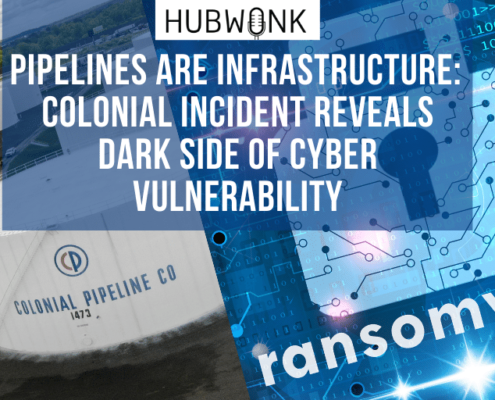
Pipelines Are Infrastructure: Colonial Incident Reveals Dark Side of Cyber Vulnerability
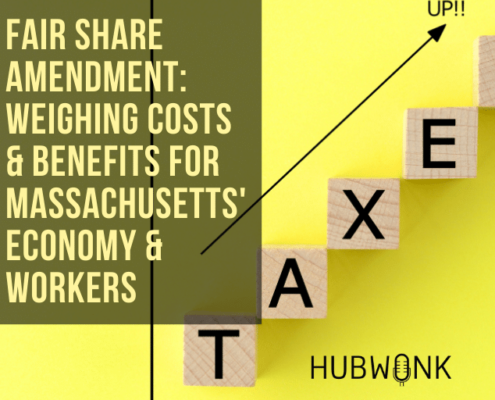
Fair Share Amendment: Weighing Costs & Benefits for Massachusetts’ Economy & Workers
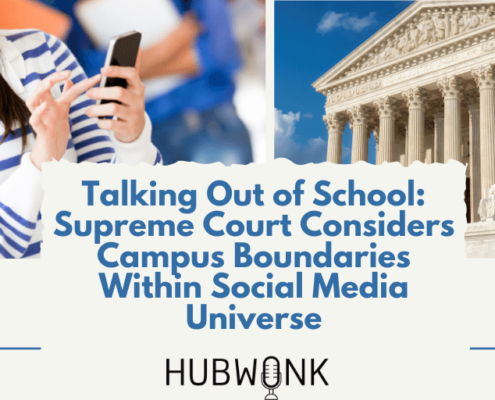
Talking Out Of School: Supreme Court Considers Campus Boundaries Within Social Media Universe

Preparing For Disaster: Health Readiness Expert’s Performance Review
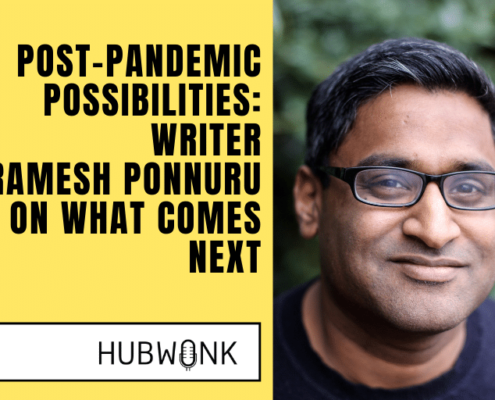
Post-Pandemic Possibilities: Writer Ramesh Ponnuru Offers Insight On What Comes Next
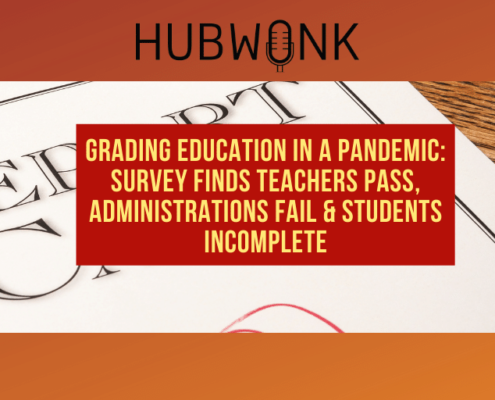
Grading Education in a Pandemic: Survey Finds Teachers Pass, Administrations Fail & Students Incomplete

Doctor Heal Thyself: Insider’s Prescription For Healthcare Reform

Travesty of Justice: Massachusetts Drug War Collapses on Lab Scandal
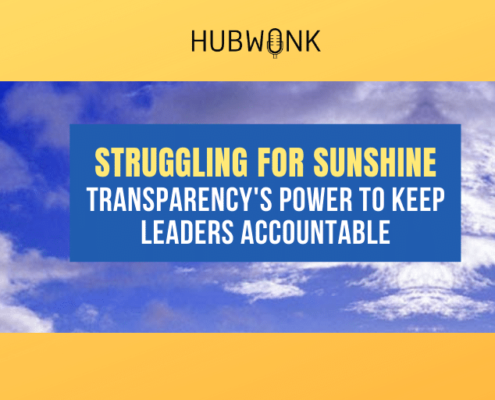
Struggling For Sunshine: Transparency’s Power To Keep Leaders Accountable


